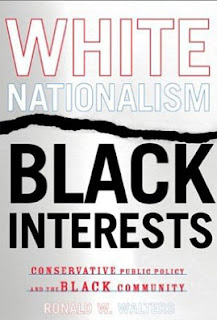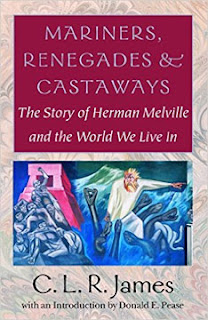White Nationalism,
Black Interests
Conservative Public Policy and the Black Community
by Ronald
W. Walters
Walters traces the emergence of what he calls a new White
Nationalism, showing how it fuels the Conservative movement, invades the public
discourse, and generates policies that protect the interests of white voters at
the expense of blacks and other nonwhites. Using historical and contemporary
examples of White Nationalist policy, as well as empirical public opinion data,
Walters demonstrates the degree to which this ideology exists among white
voters and the negative impact of its policies on the black community. White
Nationalism, Black Interests terms the current period a "second
Reconstruction," comparing the racial dynamics in the post-Civil Rights
era to those of the first Reconstruction following the end of the Civil War.
Walters's analysis of contemporary racial politics is uniquely valuable to
scholars and lay readers alike and is sure to spark further public debate.
http://www.amazon.com/dp/0814330207/ref=nosim/?tag=chickenajourn-20 http://www.amazon.com/dp/0814330207/ref=nosim/?tag=chickenajourn-20
Mariners, Renegades and Castaways:
The Story of Herman Melville and the World We Live In by C. L. R. James
In his seminal work of literary and cultural criticism, Mariners, Renegades and Castaways, James anticipated many of the concerns and ideas that have shaped the contemporary fields of American and Postcolonial Studies, yet this widely influential book has been unavailable in its complete form since its original publication in 1953. A provocative study of Moby Dick in which James challenged the prevailing Americanist interpretation that opposed a "totalitarian" Ahab and a "democratic, American" Ishmael, he offered instead a vision of a factory-like Pequod whose "captain of industry" leads the "mariners, renegades and castaways" of its crew to their doom.
In addition to demonstrating how such an interpretation supported the emerging US national security state, James also related the narrative of Moby Dick, and its resonance in American literary and political culture, to his own persecuted position at the height (or the depth) of the Truman/McCarthy era. It is precisely this personal, deeply original material that was excised from the only subsequent edition. With a new introduction by Donald E. Pease that places the work in its critical and cultural context, Mariners, Renegades and Castaways is once again available in its complete form.
Last Man Standing
— for Henry Nicholas
At age 71 Nick like a black pontiff sits at the head
table spreads his arms and invites us to a great feast
of salmon, fruits, & cakes. On his throne he’s king,
a magician who batons a dark music in a great hall
at Hyatt, Inner Harbor. His soldiers are armed with
union cards for dignity & integrity, a defense against
slave drivers of the poor. 15 years after the split I
edge to where he sits in blue solitude. He’s made it
big in Philly politics, this Mississippi bluesman, no
Ph.D., wielding power like she’s his bitch. He tells
me, “I should’ve killed him when I had a mind to,”
eyes burning into my brain. He’s got that Mafia NJ-
NY thing down pat, shifts the ground under my feet
where I sit. He starts up again, “I knew he was gonna
sell me out. I respected his wife, she I listened to.
But he broke the leash of what can catwalk in this town.
Power’s bloody, to the death.” I smiled uneasily. I
handed him my letter years ago when I was a 1199er,
for a moment “The real leaders were killed off or sold
out.” He sees the past as a sign. “The rest were followers.
I’m the last man standing.” Where are they? He ran them
down. “He’s dead . . . all dead. I made them. They betrayed
me. Where they now? Dead—no power. We’re still moving.”
I spoke of his nemesis. “He’s driven into a one-way alley,
and can’t turn around. These revolutionaries, they’ll say
anything. They ain’t got no vision to remake the world,
and they’re still losing workers.” . . . Feared, adored, Nick
mystifies, like a god awakened from the crypt. And
though he’s an SOB, treacherous & dangerous, I like
his bravado: he’s stayed the course. He concludes, “No
tears for me just go pass out some muthafuckin cards.”
http://www.nathanielturner.com/henrynicholasonsocialjusticeinamerica.htmhttp://www.nathanielturner.com/henrynicholasonsocialjusticeinamerica.htm
* * * * *
In his seminal work of literary and cultural criticism, Mariners, Renegades and Castaways, James anticipated many of the concerns and ideas that have shaped the contemporary fields of American and Postcolonial Studies, yet this widely influential book has been unavailable in its complete form since its original publication in 1953. A provocative study of Moby Dick in which James challenged the prevailing Americanist interpretation that opposed a "totalitarian" Ahab and a "democratic, American" Ishmael, he offered instead a vision of a factory-like Pequod whose "captain of industry" leads the "mariners, renegades and castaways" of its crew to their doom.
In addition to demonstrating how such an interpretation supported the emerging US national security state, James also related the narrative of Moby Dick, and its resonance in American literary and political culture, to his own persecuted position at the height (or the depth) of the Truman/McCarthy era. It is precisely this personal, deeply original material that was excised from the only subsequent edition. With a new introduction by Donald E. Pease that places the work in its critical and cultural context, Mariners, Renegades and Castaways is once again available in its complete form.
* * * * *
— for Henry Nicholas
At age 71 Nick like a black pontiff sits at the head
table spreads his arms and invites us to a great feast
of salmon, fruits, & cakes. On his throne he’s king,
a magician who batons a dark music in a great hall
at Hyatt, Inner Harbor. His soldiers are armed with
union cards for dignity & integrity, a defense against
slave drivers of the poor. 15 years after the split I
edge to where he sits in blue solitude. He’s made it
big in Philly politics, this Mississippi bluesman, no
Ph.D., wielding power like she’s his bitch. He tells
me, “I should’ve killed him when I had a mind to,”
eyes burning into my brain. He’s got that Mafia NJ-
NY thing down pat, shifts the ground under my feet
where I sit. He starts up again, “I knew he was gonna
sell me out. I respected his wife, she I listened to.
But he broke the leash of what can catwalk in this town.
Power’s bloody, to the death.” I smiled uneasily. I
handed him my letter years ago when I was a 1199er,
for a moment “The real leaders were killed off or sold
out.” He sees the past as a sign. “The rest were followers.
I’m the last man standing.” Where are they? He ran them
down. “He’s dead . . . all dead. I made them. They betrayed
me. Where they now? Dead—no power. We’re still moving.”
I spoke of his nemesis. “He’s driven into a one-way alley,
and can’t turn around. These revolutionaries, they’ll say
anything. They ain’t got no vision to remake the world,
and they’re still losing workers.” . . . Feared, adored, Nick
mystifies, like a god awakened from the crypt. And
though he’s an SOB, treacherous & dangerous, I like
his bravado: he’s stayed the course. He concludes, “No
tears for me just go pass out some muthafuckin cards.”
http://www.nathanielturner.com/henrynicholasonsocialjusticeinamerica.htmhttp://www.nathanielturner.com/henrynicholasonsocialjusticeinamerica.htm
* * * * *
Henry Nicholas on Social Justice
in America
A Black
Commentator Interview
1199 set a modern-day standard for militant advocacy for social justice, within and beyond the union movement. NUHHCE and AFSCME currently represent 375,000 health care employees. Nicholas works ceaselessly to gather the nation's health care workers under one, big union umbrella. He spoke to BC from his Philadelphia offices.
"Make sure that you're not
organizing solely to collect dues,"
says Henry Nicholas, President of
the National Union of Hospital and
Health Care Employees (NUHHCE) and
an International Vice President of
AFSCME, the giant public employees
union. Nicholas, 65, has led NUHHCE
since 1981, when it was known simply
as Local 1199 AFL-CIO.
1199 set a modern-day standard for militant advocacy for social justice, within and beyond the union movement. NUHHCE and AFSCME currently represent 375,000 health care employees. Nicholas works ceaselessly to gather the nation's health care workers under one, big union umbrella. He spoke to BC from his Philadelphia offices.
http://www.nathanielturner.com/henrynicholasonsocialjusticeinamerica.htm
C. L. R. James: A Critical
Introduction by Aldon Lynn Nielsen
* * * * *
In C. L. R. James: A Critical Introduction a literary critic undertakes for
the first time a sustained analysis of James's major published works, placing
them in the context of James's less well-known writings as an activist and
journalist. Nielsen, who was once a student in James's courses in American
universities, offers an encompassing critique of one of the African diaspora's
most significant thinkers and writers. Here the author
of Black Jacobins, World Revolution, A History of Pan-African Revolt, Notes on
Dialectics, Beyond a Boundary, and the lyric novel Minty Alley is seen not only
as among the great political philosophers but also as the literary artist that
he remained, from his first writings in Trinidad through his underground years
in America, to his final essays and speeches in London. The writings of James
have inspired revolutionaries on three continents, have altered the course of
historiography, have shown the way toward independent black political
struggles, and have established the basis for much of today's cultural studies.
* * * * *




No comments:
Post a Comment